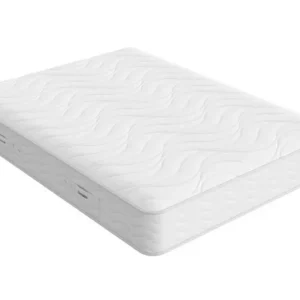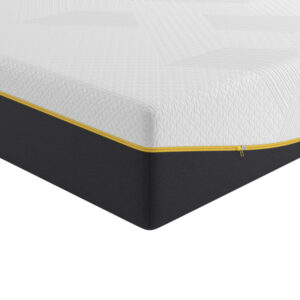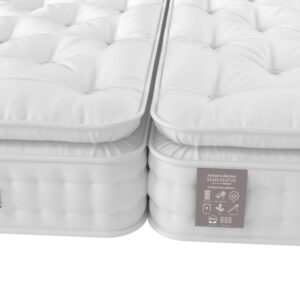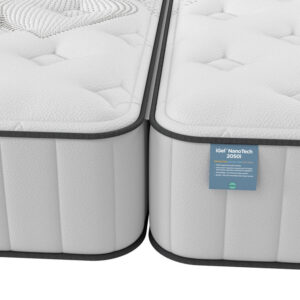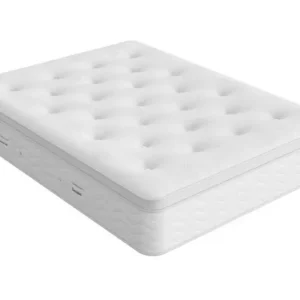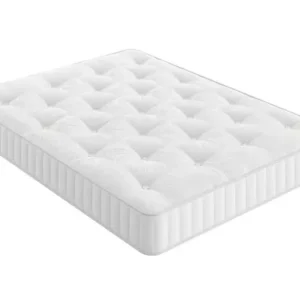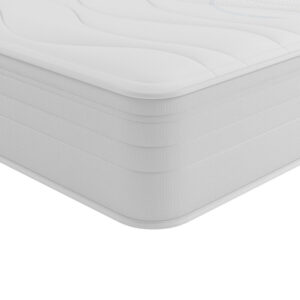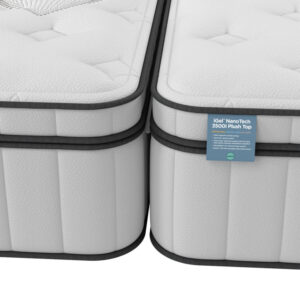Living with a frozen shoulder can be both physically and emotionally challenging, especially when it comes to getting a good night’s sleep. The pain and restricted mobility can disrupt your rest, but fear not! In this blog, we’ll share valuable insights and effective strategies to improve your sleep while dealing with a frozen shoulder.

What is a Frozen Shoulder
Frozen shoulder, also known as adhesive capsulitis, is a medical condition that affects the shoulder joint, leading to pain and limited range of motion. It occurs when the capsule surrounding the shoulder joint becomes thickened and tight, causing inflammation and scarring. As a result, the shoulder joint loses its normal flexibility and movement, leading to stiffness and discomfort.
Why does Frozen Shoulder Happen?
Frozen shoulder can be caused by various factors, including injury, trauma, immobility, certain medical conditions, age, and genetics. Women between the ages of 40 and 60 are more commonly affected, and it may also be more prevalent in individuals with certain health conditions, such as diabetes or thyroid disorders.
While a frozen shoulder can be a painful and challenging condition, it is usually treatable with a combination of physical therapy, pain management, and exercises to improve shoulder flexibility and strength.
How to Sleep with a Frozen Shoulder
1. Preparing Your Sleeping Environment:
Creating a conducive sleeping environment is essential for a restful night’s sleep. Invest in a supportive mattress and pillows to provide adequate cushioning for your shoulder. Consider using a contoured pillow that provides extra support and aligns the neck and spine properly. Additionally, choose the right sleeping position that minimizes pressure on the affected shoulder.
2. Best Sleeping Positions for Frozen Shoulder:
Finding the right sleeping position is crucial to alleviate shoulder pain and enhance sleep comfort. One of the best positions is sleeping on the unaffected side with a pillow tucked between the arm and torso for support. This helps keep the affected shoulder from rotating and causing further discomfort. Alternatively, try sleeping in a reclined position using adjustable beds or propping yourself up with pillows.
3. Stretching and Exercising Before Bed:
Gentle stretching exercises can improve shoulder flexibility and reduce stiffness. Incorporate stretching routines into your bedtime routine to relax the shoulder muscles and enhance your range of motion. Additionally, consider performing strengthening exercises during the day to alleviate pain and improve shoulder stability, which can indirectly contribute to better sleep at night.
4. Using Heat Therapy:
Applying heat to the frozen shoulder can provide relief by promoting blood flow and relaxing the muscles. Use a warm compress or heating pad on the affected area before bedtime. However, ensure not to make it too hot, and avoid falling asleep with the heat pad on to prevent burns or injury.
5. Cold Therapy for Pain Relief:
Cold therapy can be beneficial for reducing inflammation and numbing pain. Applying an ice pack to the affected shoulder for 15-20 minutes before bed can help reduce discomfort and make it easier to fall asleep. Be sure to wrap the ice pack in a cloth to protect your skin from direct contact.
6. Medications and Natural Remedies:
Over-the-counter pain relievers like ibuprofen or acetaminophen can be helpful in managing pain and improving sleep quality. However, consult your doctor before using any medication. Additionally, consider natural remedies such as turmeric, ginger, or arnica, which have anti-inflammatory properties and may offer relief.
7. Avoiding Certain Sleep Habits:
Certain sleep habits can exacerbate frozen shoulder symptoms. Avoid sleeping on the affected shoulder as it can cause more pain and discomfort. Also, try not to sleep with your arm overhead or under your pillow, as this can further limit your range of motion and cause unnecessary strain.
8. Sleep Aids and Support Devices:
Invest in ergonomic pillows designed to support the shoulder and neck. Orthopaedic pillows or those with memory foam can offer proper alignment and reduce pressure on the frozen shoulder. Additionally, consider using a shoulder brace for added support during sleep, but consult a healthcare professional before using one.
9. Relaxation Techniques:
Incorporate relaxation exercises into your bedtime routine to calm the mind and body before sleep. Deep breathing exercises, meditation, or progressive muscle relaxation can help reduce stress and make falling asleep more comfortable.
10. Adjusting Daily Activities:
Be mindful of your posture and body mechanics during daily activities to avoid putting unnecessary strain on the shoulder. Practice good ergonomics while sitting, standing, or lifting objects to prevent worsening the frozen shoulder condition.
11. Seeking Professional Help:
If you’re struggling with a frozen shoulder and it’s affecting your sleep and daily life, consider seeking professional help. Physical therapy can be effective in improving shoulder mobility and reducing pain. In some cases, medical interventions like corticosteroid injections may be recommended.
12. Coping with Nighttime Pain:
Despite your best efforts, you may still experience nighttime pain. To cope with it, try incorporating distractions like calming music or white noise. Additionally, relaxation techniques can help you shift your focus away from discomfort and promote better sleep.
Check our Products on Sale!
What type of mattress is best for sleeping with a frozen shoulder?
When dealing with a frozen shoulder, choosing the right mattress can make a significant difference in your sleep comfort and overall well-being. Ideally, you’ll want a mattress that provides adequate support and pressure relief to minimize discomfort and promote better rest.
1. Memory foam mattresses
Memory foam mattresses are often recommended for individuals with frozen shoulders due to their contouring properties. They conform to your body shape, including the curves of your shoulder, which helps distribute your body weight evenly and reduce pressure points. This can be especially beneficial for preventing additional strain on the affected shoulder during sleep.
2. Latex mattresses
Latex mattresses are another excellent option. They offer a supportive and responsive surface, contouring your body without the sinking feeling of memory foam. This responsiveness can be advantageous for people with limited mobility as it makes changing positions easier.
3. Innerspring mattresses
Innerspring mattresses with individually pocketed coils can also be considered. These mattresses provide targeted support, allowing the coils to adapt to your body’s shape, including the shoulder area. Look for models with additional comfort layers to ensure a sufficient level of pressure relief.
Ultimately, the best mattress type for sleeping with a frozen shoulder depends on personal preferences and individual needs. If possible, test out different mattress types in-store or consider mattresses with sleep trials to find the one that offers the most comfort and support for your specific condition. Remember that consulting with a healthcare professional can also provide valuable insights and recommendations tailored to your situation.
Conclusion:
Sleeping with a frozen shoulder can be challenging, but with the right strategies and adjustments, you can improve your sleep quality and overall well-being. Remember to create a comfortable sleeping environment, adopt proper sleeping positions, and consider therapeutic measures like stretching and heat therapy. Incorporate relaxation techniques into your routine and seek professional help if needed. By taking proactive steps, you can enjoy better sleep and facilitate the healing process.
Frequently Asked Questions (FAQs)
Q: Can sleeping on the affected shoulder worsen the frozen shoulder condition?
A: Sleeping on the affected shoulder can exacerbate frozen shoulder symptoms, leading to increased pain and stiffness. It’s best to avoid putting pressure on the affected shoulder while sleeping to promote healing and prevent further discomfort.
Q: How long does it take for a frozen shoulder to heal?
A: The healing process for a frozen shoulder can vary from person to person. In some cases, it may take several months to years to fully recover. Early intervention, proper care, and consistent physical therapy can help expedite the healing process.
Q: Can I use a heating pad throughout the night for pain relief?
A: It’s not recommended to use a heating pad throughout the night. Prolonged exposure to heat can cause burns or skin irritation. Instead, use a heating pad for 15-20 minutes before bedtime to help relax the shoulder muscles.
Q: Are there any specific exercises to avoid with a frozen shoulder?
A: Yes, certain exercises that involve excessive shoulder movements or weightlifting should be avoided, as they may worsen the condition. Always consult a healthcare professional or physical therapist to determine the most suitable exercises for your specific situation.
Q: Will using a shoulder brace restrict shoulder movement?
A: While shoulder braces can provide support and stability, they should not overly restrict shoulder movement. Opt for braces recommended by healthcare professionals, as they are designed to balance support and mobility, aiding in the healing process without hindering natural movement.
The information provided in this article is for educational purposes only and should not be considered a substitute for professional medical advice, diagnosis, or treatment. Always consult with a qualified healthcare provider before starting any new treatment or making changes to your current healthcare regimen. The author and publisher of this article are not liable for any damages or adverse effects resulting from the use of the information provided.

